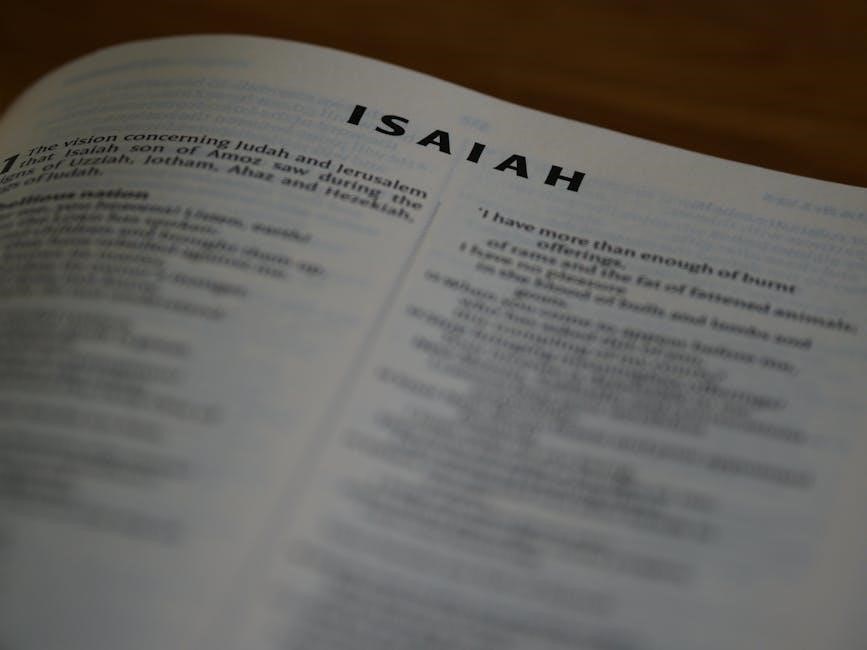The Book of Isaiah, written by the prophet Isaiah around 8th century BC, addresses Judah’s sins, redemption, and messianic prophecies, blending judgment with hope across its structured sections․
Overview of the Prophet Isaiah
Isaiah, an influential 8th-century BC prophet, is renowned for his messianic prophecies and calls for repentance․ His ministry in Jerusalem addressed corruption, emphasizing judgment and redemption․ His visions of God’s holiness and humanity’s sinfulness shaped his message, linking divine judgment with hope for restoration, deeply impacting both Judaism and Christianity․
Significance of the Book of Isaiah
Isaiah, often called the “Messianic Prophet,” holds profound theological significance, with numerous prophecies fulfilled in Jesus Christ․ His writings deeply influenced both Judaism and Christianity, emphasizing divine judgment, redemption, and hope․ The New Testament quotes Isaiah more than any other Old Testament prophet, underscoring his enduring importance in religious thought and practice․
Isaiah’s Messiannic Prophecies
Isaiah’s Messianic Prophecies
Isaiah’s prophecies foretell a Messiah who will bring redemption and restore Israel․ Key passages like Isaiah 53 depict a suffering servant who bears the sins of many, while Isaiah 9:6-7 and 11:1-5 describe the Messiah’s divine nature and reign, aligning with New Testament narratives about Jesus Christ’s mission and fulfillment․

Historical Context of the Book of Isaiah
Isaiah ministered during the 8th century BC, addressing political instability and social corruption in Judah amidst Assyrian dominance, calling for repentance while foreseeing divine judgment and redemption․
Isaiah’s Life and Ministry
Isaiah, a prophet in Jerusalem, ministered during the 8th century BC, following King Uzziah’s death․ His visions and prophecies addressed Judah’s corruption, urging repentance․ Isaiah’s ministry spanned decades, emphasizing God’s judgment and redemption, while his book’s structure reflects both poetic and narrative styles, blending historical accounts with prophetic revelations․
The Political and Social Climate of Judah
During Isaiah’s ministry in 8th-century Judah, the kingdom faced political instability and corruption under kings like Uzziah and Ahaz, leading to covenant violations․ Socially, widespread injustice and oppression of the poor prevalent, with religious hypocrisy and moral decay further exacerbating the crisis․ Isaiah’s prophecies condemned these practices, calling for repentance and faith in God’s redemption plan․
Key Events During Isaiah’s Time
Isaiah’s ministry spanned the reigns of King Uzziah, Jotham, Ahaz, and Hezekiah․ Key events included Uzziah’s death, which led to Isaiah’s vision, the Assyrian invasion of Judah, and the siege of Jerusalem․ These events shaped Isaiah’s prophetic messages, emphasizing trust in God over alliances with foreign powers to avert judgment and destruction․
Structure and Organization of the Book
The Book of Isaiah is structured into sections, blending judgment, redemption, and messianic themes, with rich metaphors, visions, and poetic rhetoric, reflecting its prophetic and theological depth․
Division of the Book into Sections
The Book of Isaiah is traditionally divided into three main sections: chapters 1–39, 40–55, and 56–66․ These sections reflect distinct themes and styles, with chapters 36–39 serving as a historical bridge․ Stylistic unity is evident across all parts, supporting the view of a coherent structure despite scholarly debates on authorship and composition․
Themes and Recurring Motifs
Isaiah explores themes of judgment, redemption, and the Holy One of Israel․ Recurring motifs include the remnant, light to the nations, and the Day of the Lord․ These themes weave throughout the book, emphasizing God’s sovereignty and His plan for Israel and the world․
Symbolism and Imagery in Isaiah
Isaiah employs vivid symbolism, such as seraphim, the throne vision, and the suffering servant, to convey divine truths․ Imagery of light vs․ darkness, the vineyard, and the Holy One of Israel reinforces theological themes, offering powerful metaphors for judgment, redemption, and God’s ultimate plan for humanity․

Theological Themes in Isaiah
The Book of Isaiah explores themes of divine judgment, redemption, and the Messiah, emphasizing God’s holiness and humanity’s need for repentance and salvation through His grace․
Judgment and Redemption
Isaiah juxtaposes God’s judgment on rebellion with the promise of redemption, emphasizing repentance and justice․ His prophecies highlight the consequences of sin while offering hope for restoration, ultimately pointing to the Messiah’s redemptive work and a renewed creation․
The Concept of the Holy One of Israel
The “Holy One of Israel” is a central theme in Isaiah, emphasizing God’s transcendence, justice, and covenant faithfulness․ This title underscores His unique nature and demands moral accountability from His people, highlighting separation from sin and devotion to divine purposes and promises․
The Servant Songs and Their Meaning
The Servant Songs (Isaiah 42:1-4, 49:1-6, 50:4-9, 52:13-53:12) depict a humble, suffering figure who bears the sins of many․ Often interpreted as prophetic of Jesus, these passages highlight divine redemption, sacrifice, and the Servant’s ultimate triumph, embodying God’s plan to restore Israel and enlighten the nations through suffering and grace․
Isaiah’s Prophecies and Their Fulfillment
Isaiah’s prophecies foretell the Messiah’s arrival, His sacrificial death, and resurrection, fulfilled in Jesus Christ, as detailed in the New Testament, confirming divine redemption and eternal salvation․
Prophecies About the Messiah
Isaiah foretells the Messiah’s arrival, describing Him as a suffering servant who bears sin, dies, and rises to redeem humanity․ Key passages like Isaiah 52:13–53:12 vividly portray His sacrificial death and resurrection, fulfilled in Jesus Christ, emphasizing divine redemption and eternal salvation for all nations․
Prophecies Regarding Israel and the Nations
Isaiah prophesies about God’s judgment on Israel for rebellion and His plan to restore the nation․ He also foretells divine judgment on surrounding nations for their sins․ Ultimately, Israel will be redeemed, and all nations will unite under God’s peaceful reign, fulfilling His covenant promises and universal kingdom․
The Fulfillment of Prophecies in the New Testament
Isaiah’s prophecies find fulfillment in Jesus Christ, notably in His death and resurrection, as described in Isaiah 52:13-53:12․ The New Testament frequently quotes Isaiah to validate Jesus’ identity as the Messiah, emphasizing divine redemption and the realization of God’s covenant promises through Him․

Stylistic Elements and Literary Features
Isaiah employs vivid metaphors, poetic imagery, and visionary experiences to convey divine messages, blending prophetic rhetoric with lyrical beauty to engage readers and emphasize spiritual truths effectively․
Use of Metaphors and Allegories
Isaiah richly employs metaphors, such as comparing God to a “Holy One of Israel” and the nation to a vineyard, alongside allegorical imagery like the “Suffering Servant,” to convey complex spiritual truths through vivid, relatable symbols that resonate deeply with readers, enhancing the prophetic message’s clarity and emotional impact significantly․
Isaiah’s Use of Poetry and Rhetoric
Isaiah masterfully employs poetic devices like parallelism, repetition, and rhythmic cadences to convey divine truths, blending lyrical beauty with prophetic intensity․ His rhetoric, marked by vivid imagery and emotive language, captivates audiences, making his message both memorable and profound, while emphasizing God’s justice, mercy, and redemptive plan for humanity and creation․
The Role of Visionary Experiences
Isaiah’s prophetic ministry was deeply shaped by visionary experiences, such as his iconic encounter with God in Isaiah 6, where he saw the Lord enthroned and was commissioned to speak to Israel․ These visions, often rich in symbolism, served as divine revelations, guiding his message of judgment, redemption, and hope for Israel and the nations․
Scholarly Debates and Authorship
Scholars debate Isaiah’s authorship, with traditional views supporting single authorship, citing consistent themes and Jesus’ citations, while modern perspectives suggest multiple authors due to stylistic variations․
Traditional View of Single Authorship
The traditional view asserts Isaiah authored the entire book, supported by stylistic consistency, thematic unity, and the repeated phrase “Holy One of Israel․” Jesus and the New Testament quote from both halves, attributing them to Isaiah, reinforcing single authorship despite modern debates․
Modern Scholarly Perspectives on Multiple Authorship
Modern scholars often propose multiple authorship, dividing the book into sections like chapters 1-39, 40-55, and 56-66, citing stylistic and thematic differences․ While unity is debated, many argue distinct voices contributed over time, reflecting historical contexts, yet maintaining thematic consistency and messianic themes throughout the text․
Evidence for and Against Single Authorship
Support for single authorship includes stylistic consistency, like the repeated phrase “Holy One of Israel,” and Jesus’ attribution of both book halves to Isaiah․ However, critics cite differences in tone and themes, such as judgment in earlier chapters versus redemption later, suggesting multiple authors over time․
Practical Application and Study
Study Isaiah by examining themes, prophecies, and historical context․ Use commentaries for deeper insights, reflecting on its messages of judgment and redemption for spiritual growth and understanding․
Approaches to Studying the Book of Isaiah
Approach Isaiah by studying its 66 chapters incrementally, focusing on themes like redemption and judgment․ Use biblical commentaries and historical context to deepen understanding․ Reflect on messianic prophecies and their significance, while applying its teachings to personal faith and spiritual growth through thoughtful analysis and prayerful reflection․
Devotional and Theological Insights
Isaiah offers profound devotional insights, emphasizing trust in God’s sovereignty and redemption․ Theologically, it highlights the Holy One of Israel’s justice and mercy, encouraging believers to pursue righteousness․ Its messianic prophecies deepen faith, while calls for repentance and holiness inspire personal spiritual reflection and growth in intimacy with God․
Resources for Further Study
Exploring commentaries like David Guzik’s insights and study guides enriches understanding; Online tools such as Bible Gateway offer accessible versions․ Podcasts and devotionals provide deeper context, while scholarly articles address complex themes, enabling readers to engage more thoroughly with Isaiah’s profound message and historical significance․

The Legacy of Isaiah
Isaiah’s profound prophecies and teachings have shaped Judaism, Christianity, and religious thought․ His timeless message of redemption and hope remains influential, guiding faith and reflection across centuries․
Influence on Judaism and Christianity
Isaiah’s prophecies deeply shaped both Judaism and Christianity․ In Judaism, he is revered for emphasizing covenant faithfulness and redemption․ Christianity highlights his messianic visions, fulfilled in Jesus, making his writings foundational for theological understanding across both traditions, bridging spiritual and historical contexts with enduring relevance․
Isaiah’s Impact on Religious Thought
Isaiah’s teachings revolutionized religious thought by introducing the concept of a suffering servant and universal salvation․ His vision of a holy God and calls for justice influenced ethical frameworks in both Judaism and Christianity, shaping doctrines of atonement and inspiring reforms across centuries with profound theological significance․
Contemporary Relevance of Isaiah’s Message
Isaiah’s message remains deeply relevant today, offering timeless themes of justice, compassion, and hope․ His calls for moral integrity and redemption resonate in addressing modern societal issues, inspiring personal and collective transformation․ The prophet’s vision of a reconciled world continues to motivate efforts toward peace and equality, transcending time and culture․
The Book of Isaiah concludes with a profound vision of redemption and divine glory, emphasizing faith, justice, and hope․ Its timeless truths continue to inspire and guide humanity․
The Book of Isaiah presents a profound vision of judgment, redemption, and messianic hope, emphasizing God’s sovereignty and humanity’s need for repentance․ Its prophecies, poetic imagery, and theological depth have shaped both Jewish and Christian traditions, offering timeless insights into divine justice and grace․
Final Thoughts on the Book of Isaiah
The Book of Isaiah, with its rich prophecies and poetic imagery, remains a cornerstone of biblical theology, offering profound insights into God’s plan of redemption․ Its timeless message continues to inspire and guide believers, emphasizing hope, justice, and the ultimate triumph of God’s grace․
Encouragement for Further Exploration
Exploring the Book of Isaiah reveals its timeless relevance, offering deep insights into God’s plan of redemption․ Its messianic prophecies and themes of justice and hope invite readers to engage deeply, fostering personal reflection and spiritual growth, while remaining a vital resource for understanding biblical theology and contemporary faith․



